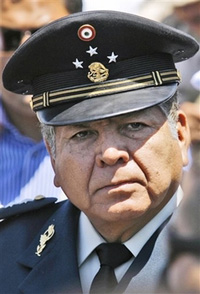
|  |  |  Editorials | Opinions | August 2008 Editorials | Opinions | August 2008  
Politics Versus the Mexican Military's War Against Crime
 Carlos Luken - MexiData.info Carlos Luken - MexiData.info
go to original


| | General Sergio Aponte Polito (AP/Guillermo Arias) | | |
Mexico’s violent and bloody war against drug cartels, in Baja California, claimed its latest and most prominent victim last week as the military strongman who led the no-nonsense campaign against organized crime was unceremoniously ousted.

General Sergio Aponte Polito was hastily relieved of his command of the Second Military Region (which covers the states of Baja California, Sonora, and Baja California Sur) after having spearheaded a very successful and unrestricted battle in which many important crime figures were apprehended and imprisoned (with some extradited to the U.S.), and after record arms and drug caches were seized and destroyed.

In a bizarre attempt to camouflage Aponte’s dismissal as routine, Mexico’s Secretary of Defense, General Guillermo Galvan Galvan, made an unexpected visit to Mexicali and personally promoted General Aponte as head of the Army’s Supreme Military Tribunal in Mexico City, while announcing a series of appointment changes which included handing over the Second Military Region’s command to General Sergio Magaña Mier from the State of Guerrero (another crime ridden Mexican region).

Although the removal from office of a highly successful crime fighter such as Aponte will undoubtedly raise speculation and suspicion in U.S. law enforcement, political and media circles, the move was expected and even heralded by many Baja California businessmen and politicians.

In the campaign’s beginning the Mexican Army’s visible presence and heavy handed tactics were received as reassuring and necessary measures to smother the intolerable crime ridden atmosphere, and the trepidation that the Baja California government was clearly incapable of stopping the crime and violence its population was forced to endure. Armored military transports filled with heavily armed soldiers patrolling the cities became commonplace, roadblocks turned routine and acceptable, and people had little difficulty accepting law enforcement agencies internal rivalries while even tolerating some random human rights violations.

In time Baja California, with all of its obvious violence, began to show positive signs of change. The drug trade was noticeably curbed, some crimes did subside, and people began to feel an eagerly anticipated and hopeful relaxed attitude.

After a short time General Aponte’s success made him a public and popular figure that rivaled politicians. He made public accusations against corrupt police forces and politicians. This ruffled feathers with civilian authorities and soon rivaling news bulletins and public statements filled the airwaves. Consequently many felt that General Aponte’s days were numbered.

In my own opinion, General Aponte’s honesty or successes have not been challenged, and I personally think they will not be. He proved to be an able, brave and honest military man.

His problem is in what he is – military.

General Aponte was schooled and trained for a different life, raised in a different environment, and expected to live and behave under a different set of rules. During all of his professional life he was expected to perform victoriously, and his mission has been (and hopefully will continue to be) to follow rules of engagement in order to vanquish enemies.

As in many other countries, along the way Mexico got desperate. Faced with a seemingly unsolvable civilian problem (crime) that quickly mushroomed into a national crisis, it pushed the panic button and instead of facing the problem by fixing its crime wrought police forces, it called in the army.

In the beginning the army’s rules of engagement worked better than societies' rules of order, but asking soldiers to permanently correct evils in a peaceful and civil manner is as stupid as asking civilians to wage a permanent strategic war against organized armies.

Civilian governments all over the world should take notice of what happened in Baja California – the lesson is both common and obvious.

A soldier is trained to fight, kill and be victorious. When a good soldier does his job, he uses tactics and strategies, not rights and negotiation. People get hurt. A politician is trained to buy time for argument, concession and to seek accommodation. Their methods are totally different.

It is a colossal error to have one and ask him to behave like the other. Doing so is not only fruitless and confusing, but dangerous as it eventually pits them against each other. In the short outcome the rules of engagement eventually overrun the rules of order, while in the long run both lose.

Carlos Luken, a MexiData.info columnist, is a Mexico-based businessman and consultant. |

 |
|  |



